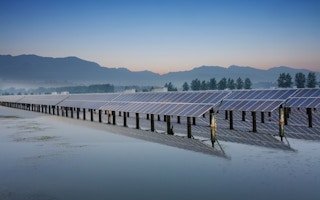Leading executives from the solar and wind industries went on the offensive this week at a climate conference in Paris, telling coal executives that renewable energy is the future, and that they had better get used to it.
Responding to comments from Tony Hayward – chairman of mining company Glencore – that “solar is not the answer to broad scale industrialization”, SkyPower chief executive Kerry Adler retorted: “Solar is the new world. You’ve got to get used to it.”
The power executives were attending a Paris business summit on climate change, six months prior to November’s highly anticipated UN conference on global climate change, which is set to be represented by 200 countries.
“
Solar is the new world. You’ve got to get used to it.
Kerry Adler, chief executive, SkyPower
Glencore’s Hayward told the audience that it is simply not possible to remove coal from the energy mix, particularly in growing countries such as India, which will require a steady, reliable power supply if the economy is to reach its potential.
To that, SkyPower’s Adler pointed to the falling costs of storage, arguing that solar and wind could “easily supply” large amounts of cheap and reliable power to countries like India.
Adler’s stance was backed by the chief executive of Acciona group, Jose Manuel Entrencanales Domecq, who remarked that it was “absolutely possible for renewable to provide baseload electricity in emerging markets” provided electricity grids were properly integrated.
The coal industry is evidently feeling the pinch as the world continues its slow but noticeable pivot away from fossil fuels.
Hayward said that coal is the best choice for meeting the power needs of countries such as China and India right now, adding that wealthier countries must help developing nations transition from polluting to clean technology.
“Unless what we deploy allows China and India to complete their industrialization in a different way to the way we industrialized then we are simply shifting the deck chairs on the Titanic,” he said.
Rachel Kyte, a climate envoy for the World Bank, revealed that China is hoping to have in place a national emissions trading system by next year – a development that could potentially prompt many other countries to follow suit.
A report by the International Renewable Energy Association (IRENA) published earlier this week revealed that solar PV is the largest employer within the renewables sector, with more than 2.5 million people working in the industry, and that renewables now employ 7.7 million people worldwide – an 18 per cent increase in the space of one year.










